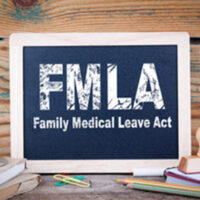What Counts as a Serious Health Condition for FMLA Leave?

When you are considering taking leave under the federal Family and Medical Leave Act (FMLA), it will be important to determine your eligibility for leave before making plans to be away from work. Generally speaking, in order to be eligible for FMLA leave, you must first work for a covered employer. Covered employers include public employers, as well as private employers with 50 or more employees during at least 20 workweeks in the most recent or previous calendar year. Employees who work for covered employers are then generally eligible if they have worked for that employer for at least 12 months and for at least 1,250 hours during that 12-month period.
Eligible employees can take up to 12 weeks of unpaid job-protected FMLA leave to care for a new child or to deal with an exigency arising out of military duty. In addition, FMLA leave can be taken to care for a spouse, parent, or child with a serious health condition or for the employee’s own serious health condition. If you are considering FMLA leave in connection with your own serious health condition or a family member’s serious health condition, it is essential to understand how the term “serious health condition” is defined for FMLA purposes.
How the FMLA Defines a Serious Health Condition
The FMLA specifically defines a serious health condition, according to the US Department of Labor (DOL), as “an illness, injury, impairment, or physical or mental condition that involves either inpatient care or continuing treatment by a health care provider.”
The term “inpatient care” is defined as “an overnight stay in a hospital, hospice, or residential medical care facility, including any period of incapacity or any subsequent treatment in connection with the overnight stay.” Even when an overnight stay in a hospital is required for elective surgery, that hospital stay will still qualify for FMLA leave.
The term “continuing treatment by a health care provider” is not as strictly defined. It can include but is not limited to in-person or telehealth visits, and it can include treatment for a period of incapacity plus treatment, chronic condition, long-term condition, permanent condition, pregnancy, or condition that requires multiple treatments.
It is important to be clear that FMLA leave can be taken for inpatient care or continuing treatment by a health care provider for a serious mental health condition — not just a physical condition. The DOL is clear that conditions involving psychotherapy, psychiatry care, counseling for substance abuse, and more can qualify for FMLA leave.
Contact a Palm Beach Gardens FMLA Attorney
Do you have questions about taking FMLA leave for a serious health condition, or do you need assistance with an FMLA claim after you took leave for a serious health condition? If your employer has violated your rights under the FMLA, you may be able to file a claim. One of the experienced Palm Beach Gardens FMLA lawyers at Sconzo Law Office can talk with you today to learn more about your case and to discuss your options with you. Contact us today for assistance.
Sources:
dol.gov/agencies/whd/fact-sheets/28p-taking-leave-when-you-or-family-has-health-condition
dol.gov/agencies/whd/fmla/mental-health
dol.gov/sites/dolgov/files/WHD/legacy/files/employerguide.pdf
